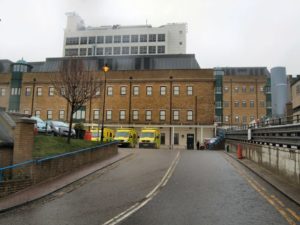Hundreds of patients who were medically fit enough to be discharged were stuck in hospitals in Brighton and the surrounding area at the start of the week.
NHS figures said that almost two thirds of patients deemed fit enough to leave hospitals run by University Hospitals Sussex NHS Foundation Trust failed to be discharged last Sunday (12 December).
Some 355 of the trust’s patients were eligible for discharge last Sunday, according to the latest available NHS data.
But only 128 left hospital on that day, with 227 – or 64 per cent – continuing to occupy a bed.
The figures included 94 patients who were fit to leave who had been in hospital for at least three weeks by last weekend – of whom only four were discharged that day.
The proportion of people remaining in beds at hospitals such as the Royal Sussex County Hospital, in Brighton, last Sunday was lower than on the same day a week earlier.
Excluding maternity patients and children, on Sunday 5 December, 67 per cent of those patients who were medically fit were not discharged.
The bed blocking figures affect the ability of hospitals to admit new patients and tackle waiting lists, according to the Health Foundation, an independent charity.
The charity spoke out as NHS figures showed that, across England, about 11,000 patients – or 69 per cent of those ready for discharge last Sunday – continued to occupy a hospital bed.
Tim Gardner, senior policy fellow at the Health Foundation, said that there was a lack of suitable capacity outside acute hospitals such as the Royal Sussex.
He said: “Problems with discharges often lead to problems admitting patients to wards from A&E (accident and emergency) departments, which in turn causes delays in ambulance handovers and can affect the ability of the ambulance service to respond to new emergencies.
“Patients who no longer require acute care may still need a combination of social care or non-acute NHS care in the community, but a lack of support following discharge means too many remain in hospital for longer than necessary.
“Reducing these longer stays would help to alleviate pressures on hospitals, creating capacity that could be better used to address the backlog of care built up during the pandemic.”
Mr Gardner added that staff shortages were also playing a part and a system overhaul was required to address the problems.
University Hospitals Sussex employs almost 20,000 people across five main hospital sites in Sussex and has an operating budget of more than £1 billion.
It runs seven hospitals in Brighton, Shoreham, Worthing, Chichester and Haywards Heath as well as several community and satellite services.
But staff absences, according to the latest daily situation report for the NHS, reached a recent peak of 1,173 on Wednesday 8 December.
The number of staff absent stood at 1,159 for the next three days and by Sunday the figure was 1,122 – the lowest level for a week.
At the same time, the number of coronavirus patients was rising. By Thursday (16 December) some 27 patients with the virus were being treated in the Royal Sussex, seven of them in intensive care or high dependency beds
At the Royal Alexandra Children’s Hospital there were five or fewer children with covid, none of them in intensive care or high dependency beds.
The NHS situation report said that an average of more than 200 patients a day were arriving by ambulance over the fortnight to last Sunday.
The total was less than 200 on one day only – Monday 29 November when the figure was 190 – while many other patients turned up at A&E by other means.
Professor Stephen Powis, NHS national medical director, said that staff were going “above and beyond”, looking after thousands of covid patients, while also delivering hundreds of thousands of coronavirus jabs.
He added: “No one wants to spend more time in hospital than needed and local NHS services are continuing to work closely with social care providers so patients can be discharged when they’re fit to leave.
“So as the NHS once again ramps up to deal with what is going to be an incredibly challenging winter, the best thing you can do to help is to come forward and get your jab.”












Yet more evidence that the crisis in the adult care system is creating backlogs in the NHS.
Trusts do all they can to reduce delayed transfers of care, given its impact on patients. However, with the latest performance figures showing more than one in 10 beds are occupied by patients who are medically fit to leave hospital, there is a pressing need to invest in social care and care in the community.
If you have a patient who can’t leave hospital because a package of care is not available to support them at home, or there is not a place in a care home, for example, that means a patient can’t move from our emergency department on to a ward.
This fills up emergency departments, which in turn means other patients are waiting to enter the emergency department in ambulances, and consequently those ambulances can’t then be attending an emergency in the community. The knock-on effect presents a clear compromise to all patients.
Never has there been a more important time to invest in social care!
You are totally right Gary, we cannot get care staff, people are off sick, or leaving the profession for better paid jobs with better work life balance in supermarkets and other retail. Local authorities have had budgets cut to the bone and urgently need more long term funding (not just until March like the latest round) so it can pay providers properly and the ability to ensure they pass that onto their staff instead of making profit.
Even when patients have someone at home willing and able to care for them the hospital will not send them home.
Too many of those whose jobs are central to discharge planning, in the NHS and outside it, stick to office hours even though patients turn up in busy hospitals like the Royal Sussex 24 hours a day. Some care homes are exemplary, but the sector has been pillaged by property-hungry private equity investors, stripping out costs like wages for carers. I’m all for a free market unless it’s not working. But like many markets where the vulture capitalists have descended, the market has become distorted. Perhaps now we’ve got Brexit done, the Government could come up with a better framework for corporate care home owners. (I know small, family-run homes are not exempt from problems, but they are not to the blame for the systemic issues.)